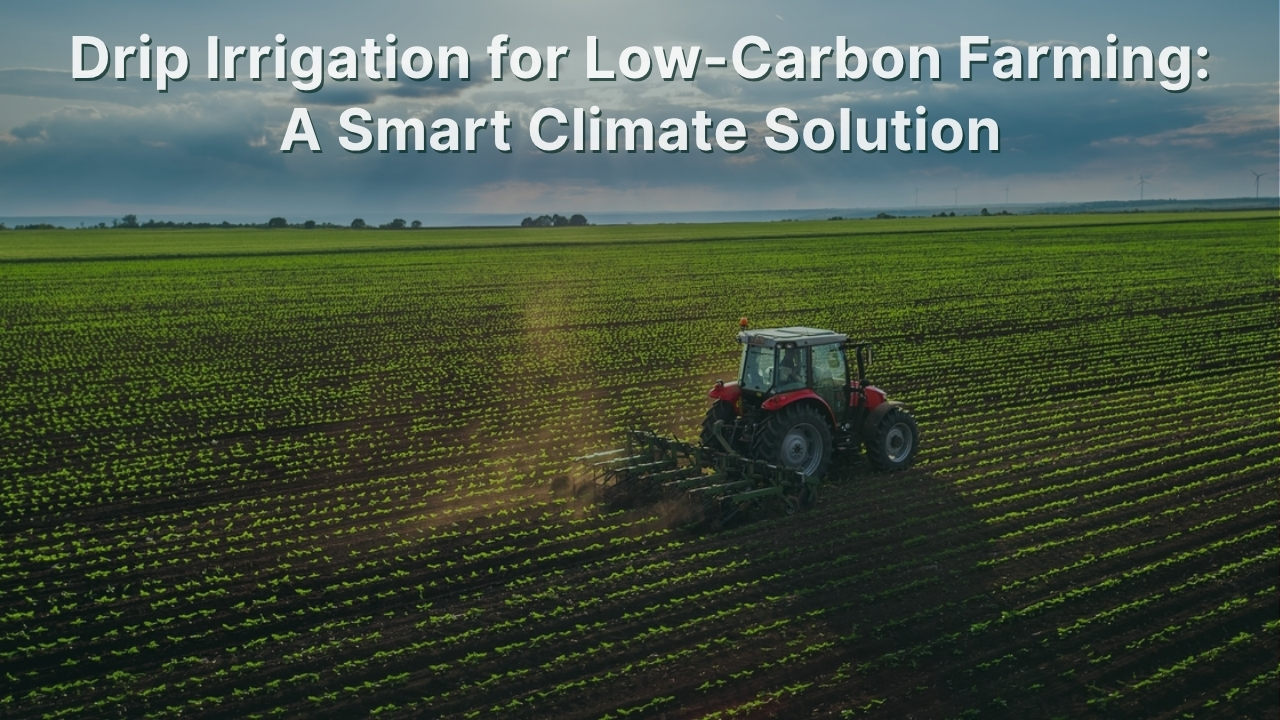Drip Irrigation for Low-Carbon Farming: A Smart Climate Solution
Science
Others

What is Drip Irrigation?
Drip irrigation, or trickle irrigation, is a precision watering system that delivers small amounts of water (typically 2–20 liters/hour) directly to the root zone of plants via a network of pipes and emitters. Unlike surface or sprinkler irrigation that wets the entire soil area, drip systems focus water only near plant roots—minimizing evaporation and runoff.
There are two types:
-
Surface drip irrigation, with pipes above ground, which can suffer from evaporation losses;
-
Subsurface drip irrigation, with buried pipes that deliver water directly to the plant rhizosphere for maximum efficiency.
How Drip Irrigation Reduces Emissions
Drip irrigation doesn’t just save water—it significantly reduces agricultural greenhouse gas (GHG) emissions. Here's how:
-
Lower N₂O emissions: By optimizing soil moisture and delivering nutrients directly to the root zone, drip irrigation limits conditions that foster nitrification and denitrification—the microbial processes responsible for nitrous oxide (N₂O) emissions. Since N₂O has 298 times the global warming potential (GWP) of CO₂, the impact is substantial. Research shows drip irrigation can reduce N₂O emissions by 32–46% compared to furrow and sprinkler systems.
-
Reduced CH₄ emissions: Drier, more aerated soils created by drip irrigation favor methanotrophs (bacteria that consume methane) while suppressing methanogens (methane-producing microbes). This can lead to 78% lower methane emissions in rice fields, where conventional flooding produces high CH₄ levels.
-
Controlled CO₂ emissions: Avoiding over-irrigation helps prevent excessive decomposition of soil organic matter, thereby limiting CO₂ emissions.
Can Drip Irrigation Generate Carbon Credits?
Yes—drip irrigation holds strong potential for carbon credits, although methodologies are still being finalized. Verra is currently developing Methodology M0321 for Precision Fertilization and Irrigation, which is expected to include drip irrigation as a key technology.
Netafim, a pioneer in carbon farming, works with growers to implement drip irrigation, monitor emissions, and issue verified carbon credits. Their La Fagiana Farm in Italy—160 hectares of rice paddies—saw the following results post-drip implementation:
-
70% less water use
-
30% less fertilizer
-
36% less energy
-
30% increase in crop yield
Want to expand your knowledge on decarbonization and carbon market topics? Don’t miss our weekly articles on Insights page and follow our LinkedIn to stay updated 🌳
References:
Andrews, H. M., Homyak, P. M., Oikawa, P. Y., Wang, J., & Jenerette, G. D. (2022). Water-conscious Management Strategies Reduce per-yield Irrigation and Soil Emissions of CO2, N2O, and NO in high-temperature Forage Cropping Systems. Agriculture, Ecosystems & Environment, 332(2022), 107944. https://doi.org/10.1016/j.agee.2022.107944
Food and Agriculture Organization. (n.d.). CHAPTER 6. DRIP IRRIGATION. FAO. https://www.fao.org/4/s8684e/s8684e07.htm
Kuang, W., Gao, X., Tenuta, M., & Zeng, F. (2021). A global meta‐analysis of nitrous oxide emission from drip‐irrigated cropping system. Global Change Biology, 27(14), 3244–3256. https://doi.org/10.1111/gcb.15636
Netafim. (2019). Drip Irrigated Rice Pioneers. Netafim. https://www.netafim.com/en/success-stories/drip-irrigated-rice-pioneers/
Parthasarathi, T., Vanitha, K., Mohandass, S., & Vered, E. (2019). Mitigation of methane gas emission in rice by drip irrigation. F1000Research, 8(2023). https://doi.org/10.12688/f1000research.20945.1
Verra. (2025). Methodology for Precision Fertilization and Irrigation for GHG Emissions Reduction and Increased Crop Yield. Verra. https://verra.org/methodologies/methodology-for-precision-fertilization-and-irrigation-for-ghg-emissions-reduction-and-increased-crop-yield/

